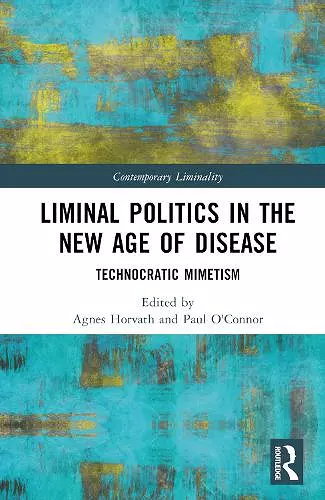Liminal Politics in the New Age of Disease
Technocratic Mimetism
Agnes Horvath editor Paul O'Connor editor
Format:Hardback
Publisher:Taylor & Francis Ltd
Published:21st Dec '22
Currently unavailable, and unfortunately no date known when it will be back

Liminal Politics in the New Age of Disease explores the phenomenon of ‘liminal politics’: an open-ended ‘state of exception’ in which normal rules no longer apply, and things which were previously unimaginable become possible – even appearing remarkably quickly to represent a ‘new normal’. With attention to the emergency measures introduced to counter the spread of Covid-19, it shows how the emergency suspension of democratic accountability, ordinary life and civil liberties, while accidental, can lend itself to orchestration and exploitation for the purpose of political gain by ‘trickster’ or ‘parasitic’ figures. An examination of the cloning of political responses from jurisdiction to jurisdiction, with little consideration of their rational justification or local context, this volume interrogates the underlying dynamics of a global technological mimetism, as novel technocratic interventions are repeated and the way is opened for new technologies to reorganise social life in a manner that threatens the disintegration of its existing patterns. As such, it will appeal to scholars and students of sociology, social theory and anthropological theory with interests in political expediency and the transformation of social life.
‘Liminal Politics in the New Age of Disease is both a timely and enduring examination of how to understand the politics of disease where the normal rules of life no longer apply. From the transformation of our daily interaction with our fellow human beings to societal decisions of whether to close the economy and suspend electoral politics, the authors of this collection explore what are the limits of our decisions as social, cultural, and political beings. A thoughtful and provocative account of what constitute politics in this age of pandemics, Liminal Politics in the New Age of Disease asks questions that are neglected and provide answers that are not definitive.’ - Lee Trepanier, Chair and Professor of Political Science, Samford University, USA
‘We are not living in a post-covid world, but in one in which the measures against covid have continued to evolve and transform social life. This book traces the changes in authority, expertise, and regimentation produced in response to covid, and the ways in which social and personal life is being recreated in response to the changes. It is a radical and indispensable starting point for thinking about these questions.’ - Stephen Turner, Distinguished University Professor, University of South Florida, USA
‘Whether the COVID-19 event was a viral pandemic or a pandemic panic, it is not over. For its supporters among the "experts," it never will be. We will be "living with COVID" for the foreseeable future. What can that prospect possibly mean? Pragmatically, it means an expansion of our—by now pervasive but conventional—technology-mediated existence. And second, it means an exponential increase in the tyrannical efficiency of the surveillance state, which is hardly confined to the PRC. Thinking about this novel condition and this novel regime requires imagination as well as analytical rationality. The authors have brought both to bear on a contingent reality that presents itself as necessary. That is the lie at its heart. We can take some comfort not so much in the stupidity of our new tyrants—though as a North American, that seems to me to be their primary domestic attribute—as that they are worthy only of ridicule. How it all plays out over the next few decades as the friction increases between the second reality within which the new tyrants live (and into which they seek to drag the rest of us) and the commonsensical reality within which most of us still live carries tremendous consequences. The authors of this important study invite us to contemplate the options and understand what they mean.’ - Barry Cooper, Professor of Political Science, University of Calgary, Canada
‘An urgent, provocative and fascinating attempt to re-think the Covid pandemic and its traces in a kind of fractal way; separate but linked patterns of analysis undergirded by conceptual concerns for ideas such as authenticity, grace and beauty, seemingly outmoded by the opportunistic technocratic mediatisation and datafication of life itself which has been turbo-charged by the pandemic restrictions and their pliant reception. The dynamic force of the endeavour is to do the work of thought to perhaps allow escape from the sterile condition of endless fearful and confused suspension in a liminoid expectant haze of waiting for the release engendered, ironically, by the coming of the next crisis and the next set of constraints.’ - Eugene McNamee, Professor, School of Law, Ulster University, UK
‘This book is an indispensable guide for understanding the pandemic and the exceptional politics surrounding it. Whilst richly sourced with empirical material on the actions of health professionals, governments, and extra-governmental institutions in the response to COVID, it addresses the potentially irreversible consequences for the relations between citizens and their states. Concealed by opaque processes in which unaccountable experts and managers imposed their agendas, this global emergency has suspended ‘normality’, subjected citizens to severe restrictions of their freedoms, and even created front lines between enemies inside societies. This book asks uncomfortable but entirely legitimate and urgent questions regarding the quality of governments, the powers of technocratic managerialism and the conspicuous absence of defence of basic human rights. Most importantly, it evokes the probability of the impending next great emergency. This poignant effort to make sense of how exceptional politics risks losing all measure is extremely lucid and makes for very rewarding reading.’ - Harald Wydra, Professor of Politics, University of Cambridge, UK
‘A must-read and timely collection of critical reflections on the pandemic as a state of exception, sharing important analyses of certain ‘blind spots’ - what the pandemic reveals about ‘the age of disease,’ ‘trickster logic’, ‘liminal politics’ and ‘technocratic mimetism.’ - Professor Maggie O'Neill, Head of the Department of Sociology & Criminology, University College Cork, Ireland
ISBN: 9781032201900
Dimensions: unknown
Weight: 453g
230 pages